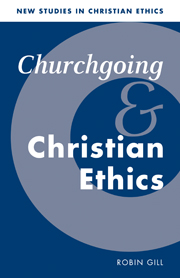Book contents
- Frontmatter
- Contents
- List of tables
- Preface
- List of abbreviations
- Introduction
- PART ONE THE THEORETICAL CONTEXT
- PART TWO THE EVIDENCE
- 4 The British Household Panel Survey
- 5 Faith in British Social Attitudes surveys
- 6 Moral Order in British Social Attitudes surveys
- 7 Love in British Social Attitudes surveys
- PART THREE THE IMPLICATIONS
- Postscript
- Works cited
- Index
5 - Faith in British Social Attitudes surveys
Published online by Cambridge University Press: 02 December 2009
- Frontmatter
- Contents
- List of tables
- Preface
- List of abbreviations
- Introduction
- PART ONE THE THEORETICAL CONTEXT
- PART TWO THE EVIDENCE
- 4 The British Household Panel Survey
- 5 Faith in British Social Attitudes surveys
- 6 Moral Order in British Social Attitudes surveys
- 7 Love in British Social Attitudes surveys
- PART THREE THE IMPLICATIONS
- Postscript
- Works cited
- Index
Summary
In much of the New Testament there is a tension between the now and the not yet. In the Synoptic Gospels this tension takes the form of the Kingdom of God which is already present in the life and ministry of Jesus and the fulfilment of the Kingdom which still lies in the future. Appropriately, in the liturgical version of the Lord's Prayer the phrase ‘your kingdom come’ is balanced by ‘for yours is the kingdom’. In Paul's writings also there is an oscillation between lyrical depictions of the fruits of the Spirit within the church and denunciations of the short-comings of his fellow Christians. The trouble for Paul is that Christians ‘are no better than pots of earthenware to contain this treasure’. Nevertheless for him:
The love of Christ leaves us no choice, when once we have reached the conclusion that one man died for all and therefore all humankind has died. His purpose in dying for all was that people, while still in life, should cease to live for themselves, and should live for him who for their sake died and was raised to life. With us therefore worldly standards have ceased to count in our estimate of any man; even if once they counted in our understanding of Christ, they do so now no longer. When anyone is united to Christ, there is a new world; the old order has gone, and a new order has already begun.
Once again this passage depicts the three distinctive features of Christian life – namely Christian belief, altruism and teleology.
- Type
- Chapter
- Information
- Churchgoing and Christian Ethics , pp. 122 - 144Publisher: Cambridge University PressPrint publication year: 1999



